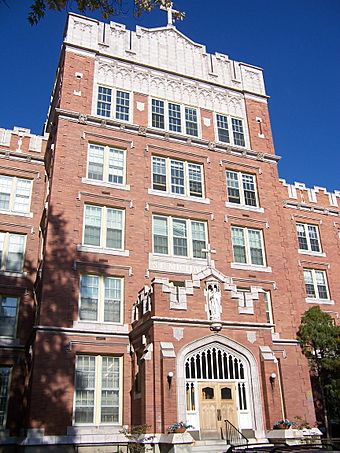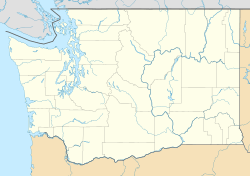Mount Saint Michael facts for kids
Quick facts for kids |
|
|
Mount Saint Michael
|
|

Mount St. Michael
|
|
| Location | 8500 N. Saint Michael Rd. |
|---|---|
| Nearest city | Spokane, Washington |
| Built | 1915–1917 |
| Architect | Julius A. Zittel |
| Architectural style | Gothic Revival |
| NRHP reference No. | 00000456 |
| Added to NRHP | May 5, 2000 |
Mount Saint Michael is a historic building in Spokane, Washington. People often call it "The Mount." It used to be a school and farm for the Jesuit order, a group within the Catholic Church.
Later, it was sold to the Congregation of Mary Immaculate Queen (CMRI). This group is made up of traditionalist Catholics who follow older traditions and do not recognize the current Pope.
Today, Mount Saint Michael is home to Saint Michael's Academy. It also serves as a church center for the CMRI group in Spokane. Priests, brothers, and sisters from the Congregation of Mary Immaculate Queen work there. The main building is where the sisters live, and the priests and brothers live in a separate building on the property.
Mount Saint Michael is listed on the National Register of Historic Places. This means it is recognized as an important historical site by the National Park Service.
Contents
Early History of Mount Saint Michael
Mount Saint Michael was started by Father Joseph Caruana. He was a Jesuit priest who began a mission north of Spokane in the mid-1800s. His goal was to help the Native Americans living in the area.
In 1878, Father Joseph Cataldo took over the mission. He bought almost 1,000 acres (about 4 square kilometers) of land for $2 an acre. He moved the mission to its current spot. From 1881 to 1915, Mount St. Michael was mostly a farm. It grew fresh food and dairy products for Gonzaga University, which is also in Spokane.
Building the Scholasticate
In 1915, construction began on a large building called a "scholasticate." This was a school for young men studying to become Jesuit priests. It cost $400,000 to build. Father Arthuis, who had just finished building a church at Gonzaga University, was in charge.
To move building materials up the steep hill, he built a special railroad. It was 1100 feet (340 meters) long and carried materials up a 320-foot (98-meter) bluff. The new building was four stories tall and built in a Tudor-Gothic style. It was shaped like the letter "T."
Inside, the building had a chapel, a dining room, a kitchen, and a gym. It also had science labs for physics and chemistry, lecture halls, and rooms for the students.
Special Features and Growth
In the 1920s, one of the Jesuit brothers built a grotto, which is a small cave-like shrine. It was dedicated to Our Lady of Lourdes. People still gather there today to pray and attend outdoor church services.
In 1929, work started on a new three-story west wing. This new part of the building could house 100 more students. It also had a new library. In 1930, a seismometer was moved from Gonzaga University to the basement of Mount St. Michael. A seismometer is a device that measures earthquakes. Scientists at Mount St. Michael carefully recorded seismic activity. Soon, the Mount became known around the world as an important center for studying earthquakes.
At this time, the 700-acre (2.8 square kilometer) farm provided all the food needed for the seminary. Jesuit brothers worked as farmers, tailors, bakers, and more. They made sure the community had everything it needed. Mount St. Michael was considered one of the best Jesuit study houses in the world.
Changes in the 1960s
In the 1960s, fewer young men joined the Jesuit order. Because of this, Mount St. Michael closed as a scholasticate in 1968. For the next ten years, it became a home for retired Jesuit priests. It was also used as a place for different religious groups to pray and hold retreats.
The Sedevacantist Congregation
In 1977, the Jesuits sold Mount St. Michael to the Congregation of Mary Immaculate Queen (CMRI). This group is a Sedevacantist Catholic congregation.
Mount St. Michael became a boys' school, a seminary, and a home for the priests and brothers of the CMRI. Over time, the leadership of the CMRI changed. Today, Mark Pivarunas is the Bishop of the congregation.
In 2007, some nuns who had been part of the CMRI left the group. They formed a new group called the Sisters of Mary, Mother of the Church. They chose to follow different Catholic teachings.
Mount Saint Michael Today
Today, Mount St. Michael serves the needs of Sedevacantist Catholics in the Spokane area. The east wing of the building is a private living area for the religious sisters.
The west wing holds church offices and a religious gift shop. This shop sells traditional Catholic books and religious items. It also has a library. The west wing is also home to Saint Michael's Academy. This is a school for boys and girls from kindergarten through 12th grade.
On the second floor, there is a chapel. This chapel serves as the main church for the parish and the school. It is used for special church services following the Tridentine Mass, which is an older form of the Catholic Mass.


